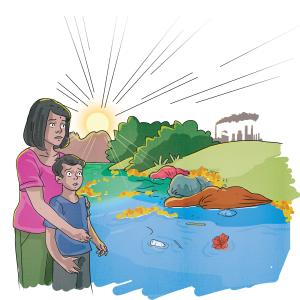
We observe World Water Day every year on March 22, to highlight the importance of water. But how much attention do we give to the amount of water we use everyday? According to a 2008 World Bank report, an average Indian household performs approximately 340 wash cycles in a year and this accounts for approximately 40.7 kilowatt hour of electricity, 47.5 kilolitre of water and 27 kilogram (kg) of detergent per household per year. We have to wash our clothes and use water and energy in our day-to-day lives, but here’s a way we can save the environment as well as a lot of money on laundry!

A few kids were tracking their paper boat in a river. Who was to say they would discover dirty truths.

A one-to-one conversation with the moon helps Piu understand why the celestial object is so important for our planet

As millions gather for Maha Kumbh 2025, can we ensure our rivers remain clean? Aarav’s journey reveals the urgent need to protect our sacred waters from pollution and neglect.

Dive into River Tales, Festivals, and a DIY Splash—just bring water, petals, and mud!

An ‘earth construction’ session on building sustainably. DIY included too!

A yummy drink of sabja and honey for believers of healthy living and wise thinking.

An exhibition of innovative ideas, offering solutions in the sphere of climate change, hosted on 30 January 2024 at the India Habitat Centre, New Delhi. ************ As part of the Green Schools Carnival 2024, the Green Schools Programme (GSP) of the Centre for Science and Environment (CSE) hosted The Solutions Showcase...

All about cracking the climate code with the Annual Climate Change Quiz in the Carnival’24. ******************* Young climate warriors from different parts of the country battled it out for the coveted title of the ultimate Climate Champions in The Bout — Green School’s Programme (GSP) annual climate quiz for schools. Organised as a signature event of the Green Schools Programme Carnival & Awards Ceremony at the India Habitat Centre on 30 January 2024, the second edition of The Bout was double the fun and double the adrenaline! Over 35 school teams, consisting students from Grades 6 to 10, participated …

An observation report made by high-schoolers in rural Maharashtra, studying the impact of climate change and the water resources installed by them a year earlier. At the cusp of the monsoon in Kharajgaon, land had laid barren for months. The countryside was tense and farmers awaited rains. Too early and the crops would die, too late and they can’t be sold. Most farmers took multiple jobs during off-season to support their families. Navin, a farmer we worked with, forced his daughters to leave school to sustain their living costs. Promised prosperous yield, they adopted inorganic fertilisers and pesticides. “We know …

